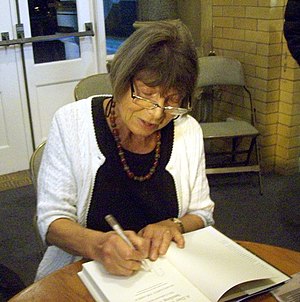
“The rare pleasure of being seen for what one is, compensates for the misery of being it.”
Share this quote:
“Family life itself, that safest, most traditional, most approved of female choices, is not a sanctuary: It is, perpetually, a dangerous place.”
Share this quote:
“When nothing is sure, everything is possible.”
Share this quote:
“Affluence was, quite simply, a question of texture ... The threadbare carpets of infancy, the coconut matting, the ill-laid linoleum, the utility furniture ... had all spoken of a life too near the bones of subsistence, too little padded, too severely worn.”
Share this quote:
“The human mind can bear plenty of reality but not too much intermittent gloom.”
Share this quote:
“Nothing succeeds, they say, like success. And certainly nothing fails like failure.”
Share this quote:
“And there isnt any way that one can get rid of the guilt of having a nice body by saying that one can serve society with it, because that would end up with oneself as what? There simply doesnt seem to be any moral place for flesh.”
Share this quote:
“You learn to put your emotional luggage where it will do some good, instead of using it to shit on other people, or blow up aeroplanes.”
Share this quote:
“Nothing fails like failure”
Share this quote:
When nothing is sure, everything is possible.
Share this quote:
Perhaps the rare and simple pleasure of being seen for what one is compensates for the misery of being it.
Share this quote:
Auntie Phyls last months in the care home were extra pieces. Age is unnecessary. Some of us, like my mother, are fortunate enough to die swiftly and suddenly, in full possession of our faculties and our fate, but more and more of us will be condemned to linger, at the mercy of anxious or indifferent relatives, careless strangers, unwanted medical interventions, increasing debility, incontinence, memory loss. We live too long, but, like the sibyl hanging in her basket in the cave at Cumae, we find it hard to die.
Share this quote:
What really annoys me are the ones who write to say, I am doing your book for my final examinations and could you please tell me what the meaning of it is. I find it just so staggering--that youre supposed to explain the meaning of your book to some total stranger! If I knew what the meanings of my books were, I wouldnt have bothered to write them.
Share this quote:
I need words and print... I need print like an addict. I could live without it, perhaps. But I hope I never have to try.
Share this quote:
It was easier to ignore the consideration of paternal genes then than it would be now. We did not then consider ourselves held in the genetic trap. We thought each infant was born pure and new and holy: a gold baby, a luminous lamb. We did not know that certain forms of breast cancer were programmed and almost ineluctable, and we would not have believed you if you had told us that in our lifetime young women would be subjecting themselves to preventative mastectomies.
Share this quote:
Minor talents or failing talents ask much of those who associate with them. They suck, they cling, they sour, they devour, and they can kill their hosts. Disappointment is a deadly companion. We didnt yet know how many of us would end up in its grip, because we were all still striving, and some of us thought we were thriving.
Share this quote:
Fran had from an unsuitably early age been attracted by the heroic death, the famous last words, the tragic farewell. Her parents had on their shelves a copy of Brewers Dictionary of Phase and fable, a book which, as a teenager, she would morbidly browse for hours. One of her favourite sections was Dying Sayings, with its fine mix of the pious, the complacent, the apocryphal, the bathetic and the defiant. Artists had fared well: Beethoven was alleged to have said I shall hear in heaven; the erotic painter Etty had declared Wonderful! Wonderful this death!; and Keats had died bravely, generously comforting his poor friend Severn.Those about to be executed had clearly had time to prepare a fine last thought, and of these she favoured the romantic Walter Raleighs, It matters little how the head lies, so the heart be right. Harriet Martineau, who had suffered so much as a child from religion, as Fran had later discovered, had stoically remarked, I see no reason why the existence of Harriet Martineau should be perpetuated, an admirably composed sentiment which had caught the child Frans attention long before she knew who Harriet Martineau was. But most of all she had liked the parting of Siward the Dane who had commended his men: Lift me up that I may die standing, not lying down like a cow.
Share this quote:
It is to be doubted whether anybody who said good-bye to Bert had any faith or interest whatsoever in the life everlasting. This life had, some of them thought, been quite bad enough.
Share this quote:
When nothing is sure everything is possible.
Share this quote:
The middle years caught between children and parents free of neither: the past stretches back too densely it is too thickly populated the future has not yet thinned out.
Share this quote: